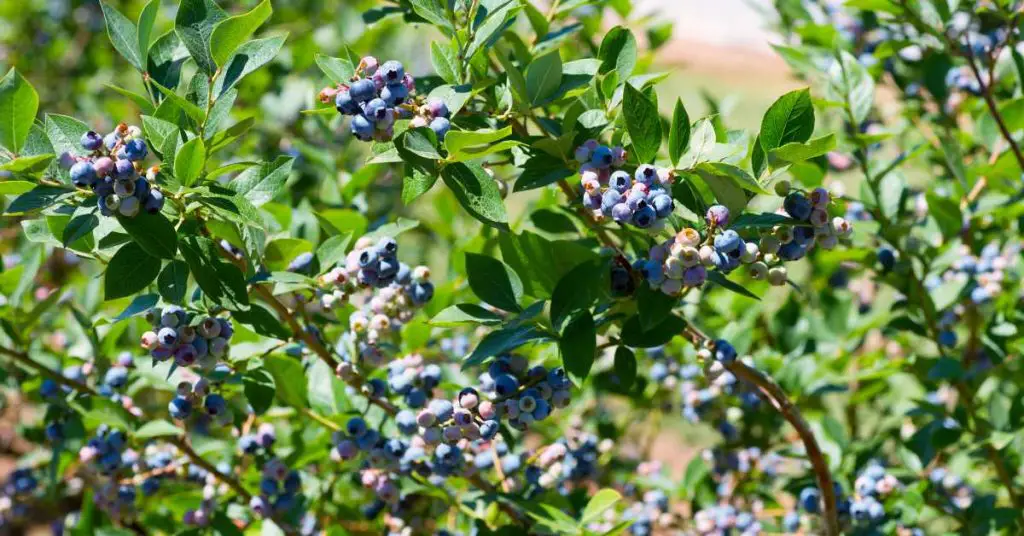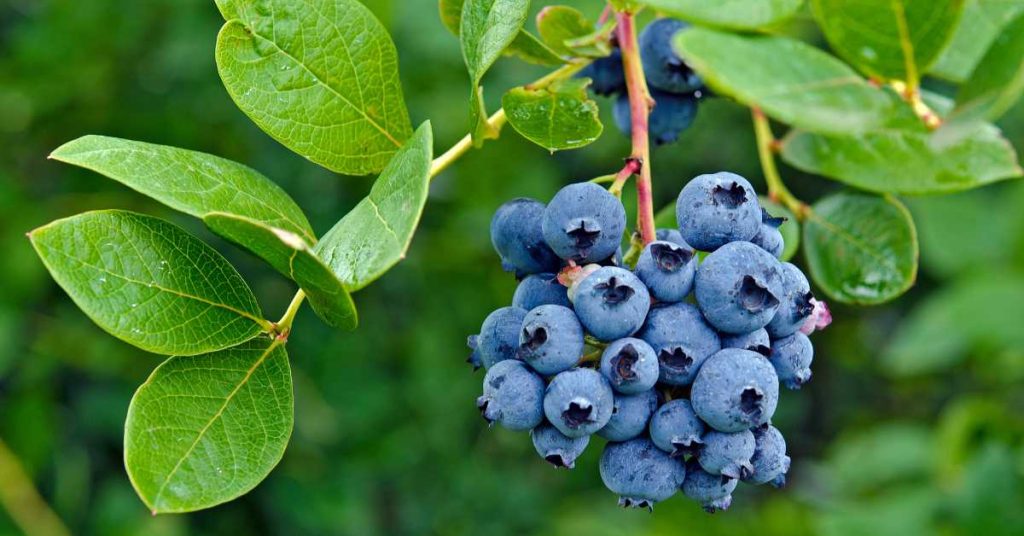Do you have blueberry bushes in your yard? If so, you’ve probably noticed that they lose their leaves in the winter. This is actually a normal part of their lifecycle, and it helps them to stay healthy and productive for the next growing season.
In fact, about 90% of all deciduous plants drop their leaves in the fall in order to conserve energy and protect themselves from the cold winter temperatures.
Whether you’re a first-time gardener, or you’ve been growing blueberry bushes for years, this article will help you understand how to care for your blueberry bushes in the winter so they can thrive in the spring.
How Do Blueberry Bushes Survive the Winter?
You may be wondering how these shrubs make it through the cold season – let’s take a closer look.
Blueberry bushes are quite resilient and hardy, able to survive cold winter temperatures and harsh weather conditions. This is due to the fact that blueberry bushes are able to go dormant during the cold season, relying on the stored energy from their roots and the nutrients found in the soil to help them survive.
As such, it’s important to ensure that your blueberry bushes are provided with the right amount of water and nutrients during the growing season, as this will give them the resources needed to survive the winter.
Additionally, blueberry bushes have a good degree of cold hardiness, meaning they can handle some degree of cold temperatures without damage. However, it’s important to provide your blueberry bushes with proper dormant care during the winter months to ensure they come out of dormancy strong and healthy.

The Impact of Temperature on Blueberry Bushes
With temperatures dipping below freezing, it’s no wonder how this cold weather affects these berry-bearing shrubs! Blueberry bushes are highly sensitive to the cold and require special care and attention to survive winter.
The impact of temperature on blueberry bushes can be broken down into four key elements:
- Dormancy: Blueberry bushes use winter dormancy as a way to protect themselves from the cold and harsh winter weather. During dormancy, the bush’s growth slows and it stops producing new leaves and flowers.
- Pruning: Pruning is a critical part of protecting blueberry bushes from winter weather. Pruning helps the bush to focus its energy on staying healthy and strong during the winter months.
- Winter Protection: Blueberry bushes need to be protected from the cold during the winter. Covering the bushes with burlap, planting them in a sheltered area, or using a cold frame can help to protect them from the cold winter temperatures.
- Insulation: Adding mulch or soil around the base of the bush can provide insulation and help to keep the bush warm during the winter months.
With the right care and attention, blueberry bushes can make it through the winter months and be ready to produce delicious berries come springtime!
The Role of Sunlight in Blueberry Bush Care
Blueberry bushes need plenty of sunlight to thrive, so ensuring they get enough of it can be key to keeping them healthy year-round. Planting your blueberry bush in an area that receives full sun, at least 8 hours a day, is essential. Also, the soil should have good drainage.
Cold hardiness is another factor that you should consider when choosing the right spot for your blueberry bush. Areas with colder climates may require a different variety of blueberry bush that’s more cold-resistant.
Getting the right amount of sun is essential for blueberry bushes. If they’re not getting enough sunlight, they may not produce as many berries or the plants may become weak. To ensure that your blueberry bush is getting enough sunlight, you can prune it to create an open shape, allowing light to reach the lower branches. Additionally, you should be sure to keep the area around your blueberry bush free from weeds and debris, which can block the sunlight.
With the appropriate sunlight and care, you can keep your blueberry bush healthy and lush for many years to come.
Watering Blueberry Bushes in Winter
In winter, blueberry bushes require careful watering to ensure they remain healthy and vibrant.
To keep your blueberry bushes healthy in winter, you should:
- Water your bushes at least once a month, but not too much.
- Consider winter mulching to protect your bushes from the cold.
- Prune the branches of your bushes in the winter, but do so sparingly.
- Monitor the soil moisture to make sure it’s not too dry.
These steps will help you keep your blueberry bushes healthy and thriving through the winter months. Caring for your blueberry bushes in winter is an important part of ensuring they’ll produce a bountiful crop come spring. With the right care, you can ensure your blueberry bushes will be around for many years to come.
Pruning Your Blueberry Bushes
Pruning your blueberry bushes is essential for keeping them healthy and producing a bountiful crop.
Winterizing the soil and dormant pruning are key components to ensuring your blueberry bushes are well-equipped to survive the winter months. Winterizing the soil will help to provide the necessary nutrients, moisture, and protection from harsh winter conditions.
Dormant pruning is the process of removing dead or diseased branches and limbs so that the bush can focus its energy on new healthy growth. This will also help to improve air circulation and sunlight absorption.
In addition to these winterizing practices, it’s also important to remove any dead or weak branches that may have been affected by the weather.
Pruning your blueberry bushes will help them to remain healthy and productive, even during the winter months.

Planting Blueberry Bushes in the Winter
Blanketed in snow, blueberry bushes hunker down, ready to face the cold winter months ahead. As the temperature drops, these dormant plants become dormant, meaning that they stop growing and require little care over the winter.
But you can still get a jump start on prepping your blueberry bushes for the upcoming season by planting them in the winter. Pruning and winter mulching are two essential steps for getting your blueberry bushes ready for the spring.
Pruning during the winter months helps to shape and control the size of your plants. Winter mulching helps protect the roots of the plants from freezing temperatures, and also helps to retain moisture in the soil.
By taking the time to properly prepare your plants in the winter, you’ll be setting them up for success once the weather warms up and they begin to grow again.
Protecting Your Blueberry Bushes from Animals
Now that you’ve got your blueberry bush planted, you’ll need to consider how to protect it from animals. After all, your blueberry bush is a delicious snack that a variety of animals will be tempted to try.
Here are a few tips to help you protect your blueberry bush in the winter:
- Use a Winter Mulching: A winter mulching will help keep your soil temperature consistent and also help keep animals away.
- Install a Fence: Installing a fence around your bush can help keep animals away.
- Prune the Bush: Pruning the bush during the winter will help keep it healthy and will also make it less appealing to animals.
- Keep the Area Clean: Make sure to keep the area around the bush free of food scraps and garbage, as this can attract animals.
These tips can help keep your blueberry bush safe from animals during the winter months. By taking the necessary precautions, you can ensure that your blueberry bush will be healthy and ready for the spring.
Fertilizing Blueberry Bushes in Winter
To help your blueberry bushes prosper in winter, you’ll want to give them a bit of extra fertilizer – ironic, since they’re already blanketed in snow!
Before the cold temperatures set in, apply a slow-release fertilizer to the soil around your blueberry bush. This will help keep the soil fertile throughout the winter season.
While your blueberry bush is dormant, you can also do some pruning so that it’s ready to burst with blueberries come springtime.
To ensure your blueberry bush can survive frost, make sure to cover it with a blanket or tarp during the coldest days of winter. Doing this will help keep the roots warm and stop any cold damage from occurring.
With a bit of extra fertilizing and pruning, your blueberry bush will be ready to take on winter and come out thriving the other side!
Frequently Asked Questions
What type of soil is best for blueberry bushes?
Are you looking for the perfect soil for your blueberry bushes?
Fertilizing and drainage are two important factors when it comes to helping your plants flourish. Blueberries prefer a soil that’s acidic, so adding a fertilizer that’s rich in sulfur, iron, or aluminum can help create and maintain the right conditions.
Additionally, good drainage is key. Blueberries don’t like wet feet, so make sure your soil isn’t too dense.
With the right soil and a bit of effort, you can be sure that your blueberry bushes will give you plenty of delicious fruit!
How often should blueberry bushes be pruned?
Pruning your blueberry bushes is key to keeping them healthy and happy. How often should you do it? Generally, you should prune your blueberry bushes once a year.
This should take place in the late winter or early spring before the new growth starts. When pruning your blueberry bushes, be sure to use the proper pruning techniques to ensure healthy new growth.
Additionally, be sure to give your blueberry bushes the fertilizer needs they require for optimal growth. With the right pruning and fertilizer, your blueberry bushes will be blooming with delicious berries in no time!
Can blueberry bushes be planted in pots?
Yes, blueberry bushes can be planted in pots! Just make sure to select a pot that is large enough to accommodate the bush’s growth, and that also has drainage holes to ensure that the soil doesn’t become too waterlogged.
When watering, you’ll want to make sure to not overdo it, as too much water can cause the soil to become acidic. As far as fertilizer, it’s important to apply it every few months to ensure that your blueberry bush is getting the nutrients it needs to grow.
Following these steps will help to ensure that your blueberry bush is happy and healthy in its pot!
How can I protect my blueberry bushes from disease?
You can protect your blueberry bushes from disease by implementing an effective pest control and disease prevention program.
Start by maintaining a clean garden and removing any weeds, debris, or fallen fruit that can attract pests.
Inspect your bushes regularly for signs of disease or pests such as wilting leaves, discoloration, or webbing. If you notice any of these signs, take action quickly to prevent the disease from spreading.
Prune away any affected branches and treat the bush with a specialized fungicide or insecticide.
Finally, use a preventative fungicide to ensure your blueberry bushes stay healthy and disease-free.
With a few simple steps, you can keep your blueberry bushes safe and thriving.
What is the ideal temperature for blueberry bushes?
You might be wondering what the ideal temperature is for your blueberry bushes. Well, the good news is that blueberry bushes are very hardy plants and can usually tolerate a wide range of temperatures.
However, for optimal growth and production, it’s best to maintain a temperature range of between 65-75°F. Additionally, make sure you stick to a consistent watering and fertilizing schedule.
This will ensure your blueberry bushes stay healthy and bear fruit year after year.
Conclusion
You can keep your blueberry bushes healthy and thriving during the winter months by providing them with the right kind of care. The temperature, sunlight, and water they need are all important factors to consider. Additionally, pruning and fertilizing can help keep your bushes strong.
You may also want to consider planting your bushes in winter and protecting them from animals. With the right care, your blueberry bushes can remain healthy and even produce fruit in the winter.
Although there’s a common belief that blueberry bushes lose their leaves in winter, this isn’t always the case. With the right care and attention, your blueberry bushes can remain healthy and keep their leaves throughout the winter.
So don’t let the winter chill keep you from caring for your blueberry bushes – they’ll be sure to thank you!





